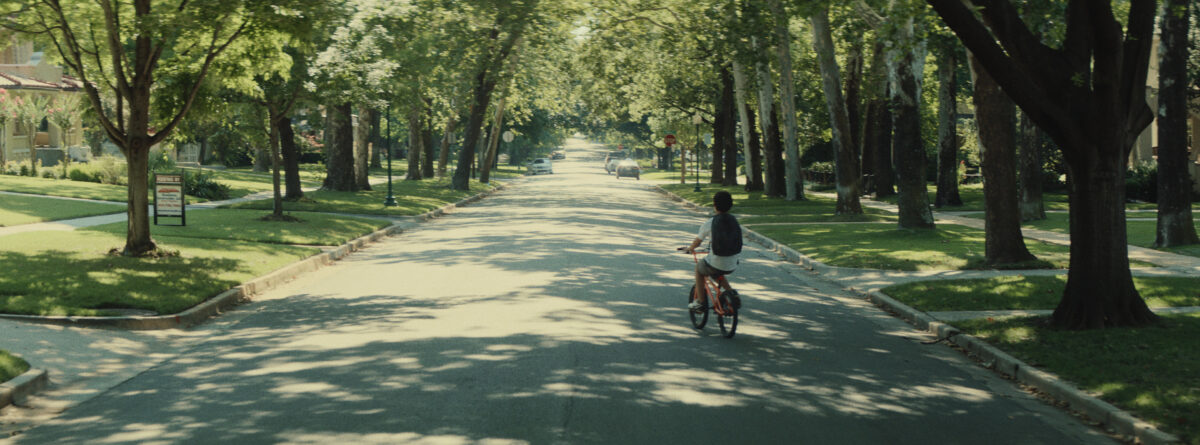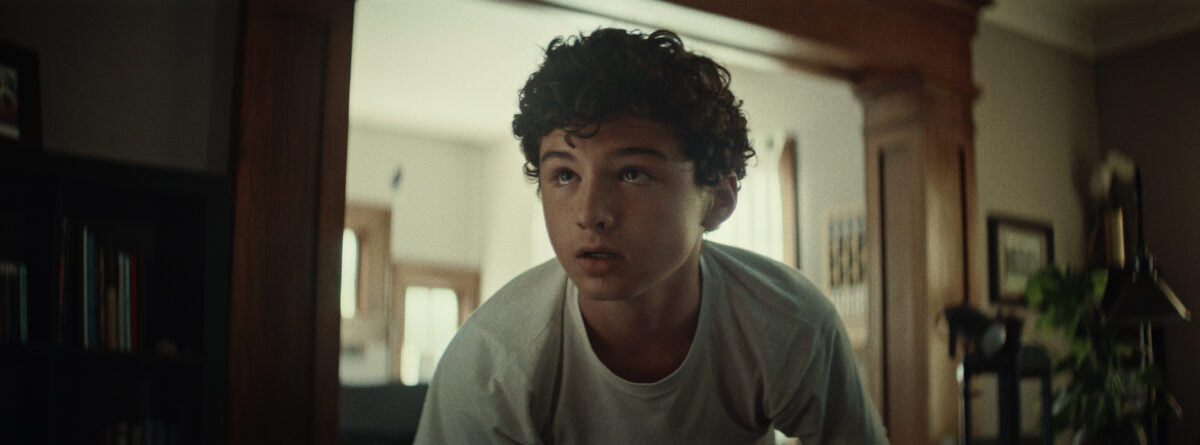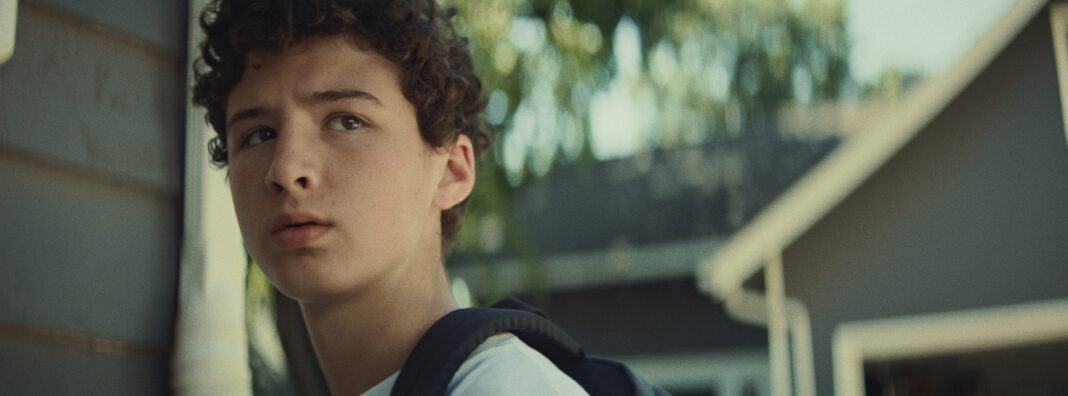A potent reminder of the desperation that is felt in some households over the basic nutritional requirements of children in order to evolve and grow comes to light in Brian Lawes’ involving short LOST KINGS, in which the older of two brothers breaks into a house to steal food, but has to deal with the homeowners when they prematurely return.
Film and TV Now spoke with the film-maker about his work on this short and the issues it highlights.
FILM AND TV NOW: The film is a simple set-up with a boy trying to get food for himself and his brother, resorting to entering a stranger’s house to achieve his goal. What was the start-off point for the script?
BRIAN LAWES: The most literal start-off point for this script actually began with a feature version of this story. However, after finishing the feature screenplay, I realized the next best step was to adapt it into a short film to help in financing the full-length version. But in a lot of ways, the initial spark for this story began much before the feature concept was ever written.
Back in my teenage years, I can remember trying to process this economic gap I was beginning to encounter in the world. At a certain age, you start to see the reality of wealth inequality all around you in your city, and you start to see yourself as a certain facet of that situation. The question emerged for me: “How do I interact with this situation, and how do I become an agent for it getting better and not worse?”
I wish I could say I’d arrived at a clear answer, but it’s an incredibly complex situation that way smarter people than myself are even more qualified to speak on. Nonetheless, what you see in my film is me exploring and wrestling with this question, and arriving at a place of empathizing with those who find themselves lacking basic needs.
FTVN: There is much comment in the world, particularly in the UK about school children suffering from hunger and malnutrition because they are not getting the optimum levels of nutrition due to their home circumstances. How much research did you do into the background and context of the short before committing yourself to a short-form script?
BL: Some of the research wasn’t done intentionally, but more so came through conversations with friends and family who work as teachers of students who find themselves in this very situation.
I have a lot of people in my life who work in education. And so, as you can imagine with the characters in our film, their teachers at school would be a consistent witness to their struggles of having basic needs met. So my research involved asking plenty of questions to this network of individuals to be sure I was being emotionally honest with my character and the situation that he found himself in.
In the end, my research ended up going much beyond this though as I fleshed out the larger feature story behind this short.
FTVN: The current pandemic has highlighted the sudden contrast in lifestyles for people who seemingly had it all together prior to March 2020, but now suddenly find themselves out of houses and work. Where would you like this film to have a key impact in this manner?
BL: In terms of impact, I always hope my audience will connect emotionally with my characters. I believe this connection is essential for an impactful and entertaining story, but also leads viewers to connect even more with themselves and others. I
I’ve heard it said that movies are empathy machines, and so when it comes to my short and those that watch it, I hope it generates an understanding in all viewers of the situations some people are finding themselves in during this challenging year.
The world seems to be growing more and more polarized in so many ways– and in a time of crisis like we’re all finding ourselves in, I think connection, empathy, and always striving to see each other’s humanity first is going to be essential in finding out way through this period in history.

FTVN: Following on from that, are there charities and organisations that you would love to show the film to that could use it as a point of reference to illustrate the desperation that some children are facing in family situations?
BL: Definitely. When it comes to sharing this story with the world, I’m open to any organization or individual that believes this film could help communicate a certain situation they’re wanting to explain. But I can’t say I necessarily set out to tell a story to reach one particular organization.
It’s important to me that the films I create are never meant to be didactic; my desire is first and foremost for them to be emotionally resonant with a character’s journey, and if that aligns with a certain audience member then I’m thrilled. In the end, I hope our film finds many different audience members who connect with the story in a variety of ways.
I think that’s the beauty of film, it can generate so many different responses depending on the viewer and the themes that emerge for them.
FTVN: Tell us about your cast.
BL: I had the most incredible cast. Even before finding them, I was fortunate to work with our amazing casting director, Chris Freihofer, to help us find the right people to bring the characters to life.
Working with each of them was really inspiring to see how they’d internalized the script and brought so much intentionality to crafting their character. More than just incredible collaborators, they were so encouraging to me as a director and for the larger feature idea. They’re all very talented and I’m so excited to see where they go next in their careers.
FTVN: Tell us about your production team.
BL: The team behind this film was one of the best I’ve ever worked with, and I’m eternally thankful they all signed on for this film. Each of them brought so much talent and passion to bring this story to life; I don’t think I can say enough about what their contribution meant to me.
When you’re sitting alone, dreaming up a script months before it becomes a reality, you hope that others will connect with your story and believe in it as much as you did. My amazing crew did just that– and honestly made it even better with their ideas and love for the film.
FTVN: The style of the film incorporates elements of noir and suspense, particularly in the key moments when the boy is trapped in the house when the family return prematurely. When you were writing the film, did you focus on the specifics of genre to create your piece?
BL: While I usually have a vague idea of the genre even before the writing process, I don’t know if I dwell on it much. The best way I can explain it is that I have a general feeling for how I think the story should be.
It’s usually hard to verbalize early on, but that feeling of what is right for the story usually is a mixture of genre, emotion, and pacing. But it does evolve some as I journey through the writing process. What I focused more on, in the beginning, was making sure the stakes for the film were clear and always at the forefront of the audience’s mind.
So when it came time to work with my Director of Photography, Vincent Gonneville, the elements of noir and suspense came rather naturally. Vincent is incredibly talented in crafting the visual language for the screen; our conversations centred around certain rules we made for ourselves to adhere to for this film, and many of those drawn from classic suspense type films.
FTVN: Like a lot of other timely and topical shorts, this has the potential to become a feature subject, a sort of modern day OLIVER TWIST-type scenario upgraded for the 21 st Century. If you were to do a feature version of LOST KINGS, how would you expand the story?
BL: Like I hinted at earlier, this short is actually a proof of concept for a feature script I wrote first, so I’m happy to hear you saw the potential for the longer story.
In the longer story, we link up with the same character from the short, but this time alongside his group of friends as they go through a series of break-ins to try and provide for their struggling families. However, as they head down this journey, it has unintended ripples effects that in turn endanger the families they set out to protect.
What we’re watching in the short is a smaller story of how the break-ins begin in the feature, but in the longer version their actions escalate much beyond what we see in the shorter story and the stakes get much higher.

FTVN: Where did you shoot and for how long?
BL: We shot the film over the course of three days in Oklahoma City, Oklahoma. However, we spent a great deal of time in pre-production over the months that preceded the actual days on set.
FTVN: How did you raise finance for the film?
BL: A majority was financed from several years of personal savings, but each of the producers contributed a small portion as well. Fortunately, we also received two production grants: the first was from the Oklahoma Visual Arts Coalition, and the second was from the Camera Ambassador’s 2019 Community Builders Grant.
Truthfully though, every crew member sacrificed in some way or another to help make the film possible, so it felt like a collective effort to get the film made within our budget constraints.
FTVN: How has COVID-19 affected your development and evolution as a film-maker?
BL: COVID-19 has definitely forced me into more of a writing season that I originally intended for 2020, but I’ve tried to make the best of it. I’m fortunate to now have a handful of new scripts either completed or in an early draft after the pandemic lock down. As far as festivals go, it seems to have delayed our festival run a bit as well. But I’m hopeful that after our back-to-back Oscar Qualifying festival premieres this October that it’ll open the doors to share the film with a much larger audience.
Although the year has brought its challenges as a film-maker, it’s also presented an opportunity to take a step back and re-evaluate what stories I most want to tell. I hope in hindsight it was a year that focused my efforts more than distracted them.
FTVN: Finally, what are you most proud of about LOST KINGS?
BL: First and foremost, I am most proud of my team. The cast and crew on Lost Kings were some of the best I’ve ever worked with, and this film would not have been possible without the incredible talents of all who were involved. I could brag on each and every one of them for a long time.
I’m also incredibly proud of the story we captured. I feel that we created something that was beautiful, true, and exactly what I dreamt it could be as I was writing– and that feels pretty incredible to have accomplished.





























